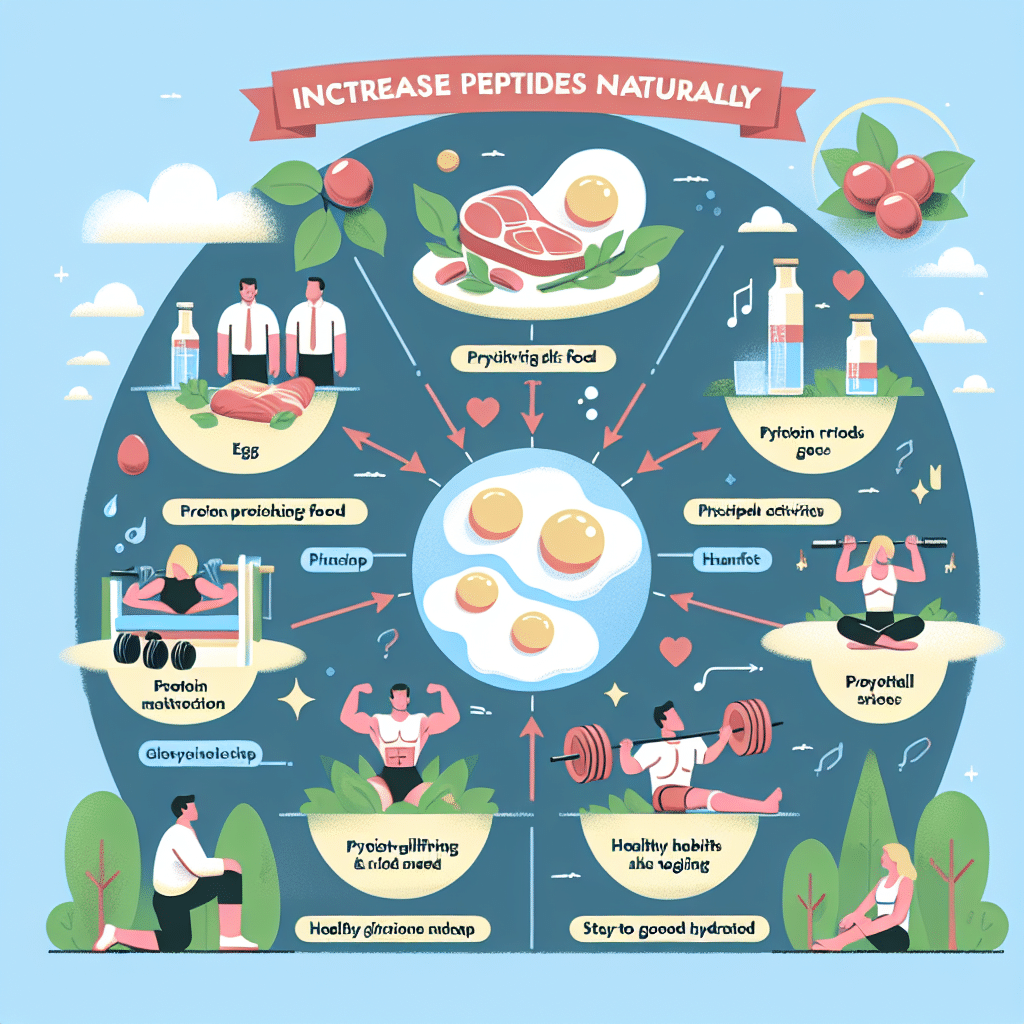How Can I Increase My Peptides Naturally? The answer
Table of Contents
- Increase Your Peptides Naturally: Effective Strategies and Tips
- Understanding the Importance of Peptides
- Nutrition: The Foundation for Peptide Production
- Exercise: A Catalyst for Peptide Production
- Quality Sleep: Essential for Peptide Regulation
- Stress Management: Reducing Cortisol to Boost Peptides
- Supplementation: Supporting Natural Peptide Production
- Conclusion: Integrating Strategies for Peptide Enhancement
- Boost Your Health with ETprotein’s Protein Products
Increase Your Peptides Naturally: Effective Strategies and Tips

Peptides are short chains of amino acids that are integral to numerous biological processes in the human body. They play a crucial role in the regulation of activities ranging from immune responses to muscle repair and growth. As the interest in health and longevity continues to rise, many individuals are seeking ways to increase their peptide levels naturally. This article explores various strategies to boost peptide production, ensuring that your body functions optimally.
Understanding the Importance of Peptides
Before delving into how to increase peptides naturally, it’s essential to understand their significance. Peptides act as signaling molecules in the body, influencing a wide array of functions such as hormone production, inflammation control, and tissue repair. They can also have antimicrobial properties and are involved in the body’s defense mechanisms. With such a pivotal role, maintaining adequate peptide levels is vital for overall health and well-being.
Nutrition: The Foundation for Peptide Production
One of the most effective ways to boost your body’s peptide production is through proper nutrition. A diet rich in protein provides the necessary amino acids that are the building blocks of peptides.
- High-Quality Protein Sources: Include a variety of protein-rich foods in your diet, such as lean meats, fish, eggs, dairy products, legumes, and nuts. These foods contain essential amino acids that your body cannot produce on its own.
- Collagen-Rich Foods: Consuming foods high in collagen, like bone broth, can directly increase certain types of peptides that benefit skin, joint, and bone health.
- Plant-Based Proteins: For vegetarians and vegans, soy products, quinoa, and hemp seeds are excellent sources of complete proteins that can support peptide synthesis.
Exercise: A Catalyst for Peptide Production
Physical activity is another powerful way to stimulate natural peptide production. Exercise induces muscle damage, which in turn triggers the release of peptides that aid in muscle repair and growth.
- Resistance Training: Engaging in weightlifting or bodyweight exercises can increase the production of growth hormone peptides, which are essential for muscle development.
- Cardiovascular Exercise: Aerobic activities like running, cycling, or swimming can enhance the release of peptides related to cardiovascular health and fat metabolism.
- Consistency is Key: Regular exercise, rather than sporadic intense sessions, is more effective in maintaining elevated peptide levels.
Quality Sleep: Essential for Peptide Regulation
Getting enough quality sleep is crucial for peptide regulation. During sleep, the body undergoes repair and regeneration processes that involve peptides.
- Optimize Sleep Patterns: Aim for 7-9 hours of uninterrupted sleep per night to ensure your body can effectively produce and regulate peptides.
- Establish a Sleep Routine: Consistent sleep and wake times can help regulate your circadian rhythm, which is closely linked to hormone and peptide production.
Stress Management: Reducing Cortisol to Boost Peptides
Chronic stress can lead to elevated cortisol levels, which may inhibit peptide production. Managing stress is therefore essential for maintaining healthy peptide levels.
- Mindfulness and Meditation: These practices can reduce stress and promote a balance in peptide-related hormones.
- Regular Relaxation: Engaging in activities that you enjoy and that relax you, such as reading, walking, or listening to music, can help manage stress levels.
Supplementation: Supporting Natural Peptide Production
While the body can produce peptides naturally, certain supplements can support this process.
- Amino Acid Supplements: Supplementing with specific amino acids like L-glutamine, L-arginine, and branched-chain amino acids (BCAAs) can provide the raw materials for peptide synthesis.
- Collagen Supplements: Hydrolyzed collagen supplements can be easily absorbed and utilized by the body to increase collagen peptides.
- Peptide Supplements: Specific peptide supplements are available that can mimic natural peptides in the body, though these should be used under the guidance of a healthcare professional.
Conclusion: Integrating Strategies for Peptide Enhancement
In conclusion, increasing your peptides naturally involves a multifaceted approach that includes a balanced diet rich in protein, regular exercise, quality sleep, stress management, and potentially, supplementation. By integrating these strategies into your lifestyle, you can support your body’s peptide production and enjoy the associated health benefits.
Boost Your Health with ETprotein’s Protein Products
If you’re looking to enhance your peptide levels through diet, ETprotein offers a range of high-quality protein products that can help. Their organic and non-GMO protein powders, including rice, pea, and various seed proteins, provide the essential amino acids necessary for natural peptide synthesis. Additionally, ETprotein’s L-(+)-Ergothioneine products offer purity and quality that can support your health goals. Consider incorporating ETprotein’s offerings into your diet for a convenient and effective way to boost your peptide levels naturally.
About ETprotein:
ETprotein, a reputable protein and L-(+)-Ergothioneine (EGT) Chinese factory manufacturer and supplier, is renowned for producing, stocking, exporting, and delivering the highest quality organic bulk vegan proteins and L-(+)-Ergothioneine. They include Organic rice protein, clear rice protein, pea protein, clear pea protein, watermelon seed protein, pumpkin seed protein, sunflower seed protein, mung bean protein, peanut protein, and L-(+)-Ergothioneine EGT Pharmaceutical grade, L-(+)-Ergothioneine EGT food grade, L-(+)-Ergothioneine EGT cosmetic grade, L-(+)-Ergothioneine EGT reference grade and L-(+)-Ergothioneine EGT standard. Their offerings, characterized by a neutral taste, non-GMO, allergen-free attributes, with L-(+)-Ergothioneine purity over 98%, 99%, cater to a diverse range of industries. They serve nutraceutical, pharmaceutical, cosmeceutical, veterinary, as well as food and beverage finished product distributors, traders, and manufacturers across Europe, USA, Canada, Australia, Thailand, Japan, Korea, Brazil, and Chile, among others.
ETprotein specialization includes exporting and delivering tailor-made protein powder and finished nutritional supplements. Their extensive product range covers sectors like Food and Beverage, Sports Nutrition, Weight Management, Dietary Supplements, Health and Wellness Products, and Infant Formula, ensuring comprehensive solutions to meet all your protein needs.
As a trusted company by leading global food and beverage brands and Fortune 500 companies, ETprotein reinforces China’s reputation in the global arena. For more information or to sample their products, please contact them and email sales(at)ETprotein.com today.














